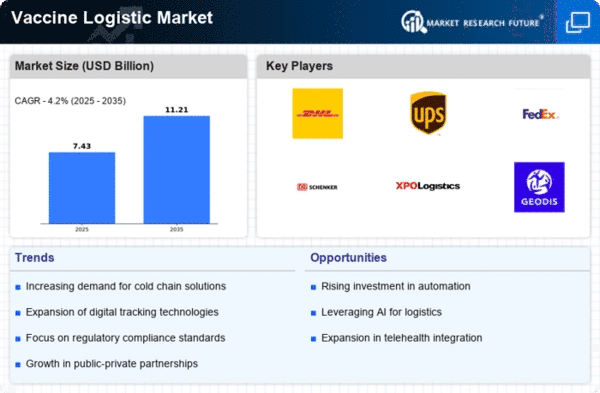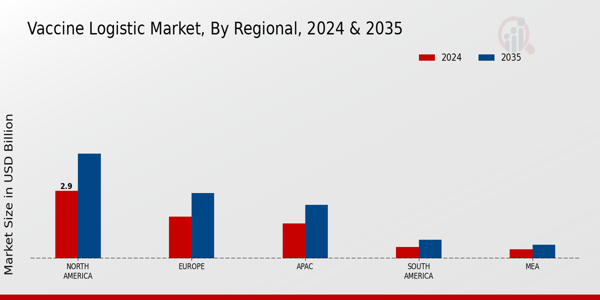Global Health Initiatives
Global health initiatives aimed at eradicating diseases and improving vaccination coverage are key drivers of the Global Vaccine Logistic Market Industry. Organizations such as the World Health Organization and various non-governmental organizations actively promote vaccination campaigns, necessitating efficient logistics solutions to distribute vaccines effectively. These initiatives often involve partnerships between governments and private sector players, leading to increased investments in logistics infrastructure. As these campaigns expand, the demand for specialized logistics services is expected to rise, contributing to market growth. By 2035, the market is projected to reach 11.2 USD Billion, reflecting the impact of these global efforts.
Increasing Vaccine Demand
The Global Vaccine Logistic Market Industry experiences a surge in demand for vaccines, driven by the rising prevalence of infectious diseases and the growing awareness of vaccination benefits. In 2024, the market is valued at approximately 7.12 USD Billion, reflecting a robust need for efficient logistics solutions to ensure timely delivery and distribution. This demand is further fueled by government initiatives promoting vaccination programs worldwide, which necessitate a well-structured logistics framework. As countries ramp up their vaccination efforts, the logistics sector must adapt to handle increased volumes, ensuring that vaccines reach healthcare facilities promptly and safely.
Market Growth Projections
The Global Vaccine Logistic Market Industry is poised for significant growth, with projections indicating an increase from 7.12 USD Billion in 2024 to 11.2 USD Billion by 2035. This growth trajectory suggests a compound annual growth rate of 4.2% from 2025 to 2035, driven by various factors including technological advancements, regulatory support, and increasing vaccine demand. The market dynamics reflect a complex interplay of global health initiatives and emerging market opportunities, necessitating a strategic approach to logistics management. Stakeholders in the industry must remain agile to adapt to evolving demands and capitalize on growth opportunities.
Regulatory Support and Compliance
Regulatory frameworks significantly influence the Global Vaccine Logistic Market Industry, as governments establish stringent guidelines to ensure vaccine safety and efficacy. Compliance with these regulations necessitates robust logistics systems capable of maintaining the cold chain and adhering to storage requirements. In recent years, regulatory bodies have intensified their focus on logistics practices, which has led to increased investments in infrastructure and training. This regulatory support is essential for fostering trust in vaccination programs and ensuring that logistics providers meet the necessary standards. Consequently, the market is likely to benefit from enhanced credibility and operational efficiency.
Emerging Markets and Population Growth
Emerging markets and population growth present substantial opportunities for the Global Vaccine Logistic Market Industry. As populations in developing regions expand, the demand for vaccines is anticipated to increase correspondingly. This trend is particularly evident in countries with limited healthcare infrastructure, where efficient logistics solutions are crucial for ensuring vaccine accessibility. The projected compound annual growth rate of 4.2% from 2025 to 2035 indicates a sustained expansion in the market, driven by the need to address healthcare disparities. Logistics providers are likely to focus on developing tailored solutions that cater to the unique challenges faced by these regions.
Technological Advancements in Logistics
Technological innovations play a pivotal role in shaping the Global Vaccine Logistic Market Industry. The integration of advanced tracking systems, temperature-controlled transport solutions, and automated inventory management enhances the efficiency and reliability of vaccine distribution. For instance, the use of IoT devices allows real-time monitoring of vaccine storage conditions, ensuring compliance with safety standards. These advancements not only streamline operations but also reduce the risk of spoilage, which is critical given the sensitive nature of vaccines. As technology continues to evolve, it is likely to drive further improvements in logistics processes, contributing to market growth.















